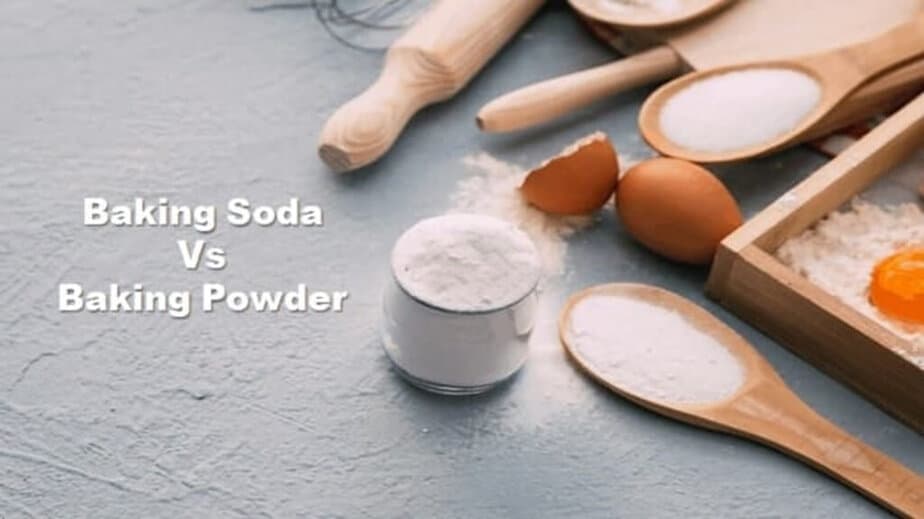Are baking soda and baking powder the same? Can I substitute baking soda with baking powder and vice versa? We’ve got the answers.
Both baking soda and baking powder are leavening agents used in baking. Sodium bicarbonate is the common ingredient in both of them. When sodium bicarbonate reacts with acid components, it softens and rises up the dough by creating air bubbles in it.
Cooks use different names for Sodium bicarbonate like bread soda, baking soda, cooking soda, and bicarbonate of soda.
What is Baking Soda?
Baking soda is just plain and pure sodium bicarbonate.
Sodium bicarbonate is a chemical compound with the formula NaHCO3. This is a kind of salt that contains bicarbonate ions and sodium ions.
This white crystalline powder is slightly salty and alkaline in taste.
Baking soda needs to be combined with an acidic substance (such as buttermilk, lemon juice, or others) to produce the leavening effect in baking.
Using baking soda with a natural acidic substance can produce a greater leavening effect than using baking powder.
The shelf life of baking soda is indefinite whereas the baking powder lasts only for a few months.
What Is Baking Powder?
Baking powder is different from baking soda because it contains acid in addition to sodium bicarbonate.
It usually contains fillers like cream of tartar or cornstarch which add acidic content to it.
When this powder is mixed with water, the bicarbonate reacts with the acid. This is an acid-base reaction that releases carbon dioxide gas that forms bubbles in the dough.
The carbon dioxide bubbles formed in the baking mixture (dough) expand and adds volume to bread, cake, and other baked goods.
Baking powder is made by adding an acid component to sodium bicarbonate (baking soda).
Those who wish to avoid sodium bicarbonate may use a baking powder substitute in baking.
Baking Powder Vs. Baking Soda
Baking powder is made of baking soda and it has an acidic ingredient like cream of tartar. On the other hand, baking soda contains sodium bicarbonate only.
The uniqueness of baking soda:
- Has only one ingredient – Sodium Bicarbonate.
- Does not include Monocalcium Phosphate.
- Immediate reactions with acids.
- Short leavening process
- Do not make the baked goods fluffy due to the shorter reaction period.
The uniqueness of baking powder:
- Consists of many ingredients including Bicarbonates (typically baking soda), and acid salts.
- Includes Monocalcium Phosphate, which reacts with NaHCO3 when wetted and heated.
- Reacts at a slower speed when exposed to acids.
- An extended leavening process with the help of a second acid.
- Gives fluffier products from baking
Should I use baking soda or baking powder?
Baking powder is a convenient leavening agent in cakes and cookies for it eliminates the need to calculate how much acid needs to go into the batter.
The base is the only ingredient in baking soda and an excess amount of it can make your dish taste alkaline and gray-colored.
Baking powder does not add an alkaline taste to food for it contains other chemical agents that will neutralize each other and make it undetectable to your taste buds.
Baking soda is useful in rendering crispiness and rich, dark color that is appealing in cookies. It works fantastically well when combined with brown sugar. The alkaline taste of the baking powder is somewhat similar to saltiness which many enjoy, especially in cookies.
Baking soda can mellow down the sharp taste of acidic ingredients in your recipe. A smidgen of baking soda cuts the sourness without going overboard on the sweetener. For this reason, using both powder and soda is a perfect option in several recipes, especially in cake recipes.
The baking powder as a substitute for baking soda works well if your dough is getting cooked right away. If you are using baking soda as a replacement for baking powder, you’ll need to add an acid (something like lemon juice, vinegar, or others) to activate the baking soda.
Frequently Asked Questions
Can I use baking powder in place of baking soda?
Yes, but the results may differ on the final product. Chefs recommend using triple the amount of baking powder that you would use for baking soda. In other words, substitute one teaspoon of baking soda with three teaspoons of baking powder.
How to convert baking soda into baking powder?
Convert baking soda into baking powder by adding tartaric acid to it. To make baking powder, mix one part baking soda and two parts cream of tartar. Additionally, you may also add 1 part of starch (preferably cornstarch) to the mixture. The starch serves to absorb moisture and prolong its potency during storage.
Why are both baking powder and baking soda used in some recipes?
In recipes that contain some sort of acid (like brown sugar, lemon juice, yogurt, etc.) the carbon dioxide created by baking soda and acid isn’t sufficient enough to leaven the volume of batter. Thus adding one part of baking powder in such recipes gives the necessary lift, and also affects both browning and flavoring.
Which is better baking powder or baking soda?
Baking powder is used in recipes that do not include an acidic ingredient. Baking soda is about three to four times stronger than baking powder, thus too much of it can make the food taste soapy or metallic. Baking powder is an all-in-one leavener and it fits into most recipes.
Final Thoughts
In baking, both baking soda and baking powder serve as leavening agents that help baked items expand.
Baking soda consists solely of sodium bicarbonate and needs an external acid for activation, whereas baking powder is a blend of sodium bicarbonate, an acid, and cornstarch and activates with just moisture.
Baking soda is ideal for recipes with acidic ingredients while baking powder is a more flexible option for various recipes.
Related Articles:
